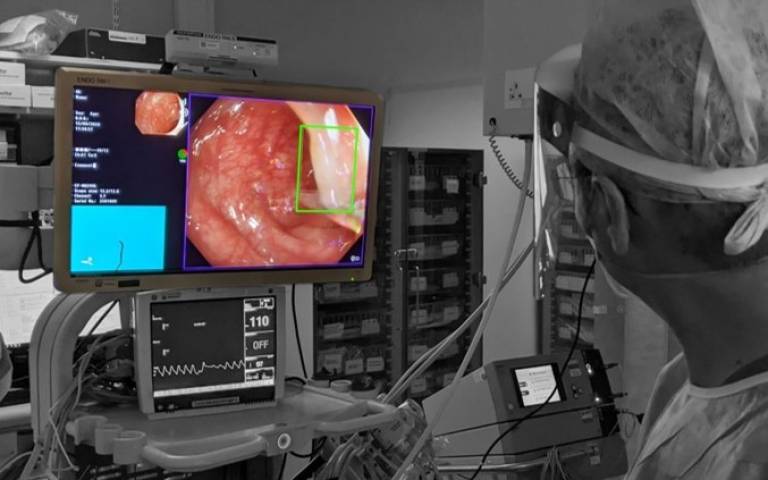NHS fast tracks UCL spin out to fight bowel cancer detection
8 September 2020
Odin Vision, a UCL spin out company, has been awarded UK Government funding to further test and develop its revolutionary artificial intelligence (AI) technology, which assists doctors to detect and characterise early signs of bowel cancer.

As part of the National Institute of Health Research’s (NIHR) new AI in Health Care Award, Odin Vision will receive £1m to support research and development of its award-winning CADDIE system. The CADDIE technology will be installed into selected hospitals across the UK to evaluate its impact on patient outcomes and the cost benefits to the NHS.
The Rt Hon Matt Hancock MP, Secretary of State for Health and Social Care, made the announcement that Odin Vision has been recognised as one of the first companies to benefit from its new £50m funding stream which accelerates the testing of cutting-edge AI technologies in the NHS. The funding forms part of the NHS Artificial Intelligence Lab and the award is managed by the Accelerated Access Collaborative in partnership with NHSX and NIHR.
Bowel cancer is the second most common cause of cancer-related deaths in the UK – with the mortality rate predicted to increase by 50% in the next 15 years. Detecting it using traditional colonoscopy methods can be challenging and up to 25% of polyps are missed. With a survival rate of 90% through early diagnosis, new ways of identifying and diagnosing cancerous growths sooner are therefore, a priority.
Odin Vision’s pioneering AI system, based on the academic research of UCL AI experts led by Professor Danail Stoyanov (UCL Computer Science and Wellcome / EPSRC Centre for Interventional and Surgical Sciences at UCL), identifies and characterises polyps by analysing live colonoscopy video, leading to early treatment and saving lives.
Peter Mountney, CEO of Odin Vision, said: “We are delighted to receive this funding and support for our AI medical device that aims to improve the early detection and analysis of bowel cancer. We look forward to working with the NHSX AI Lab and our project partners to bring the technology to patients and build strong clinical evidence to accelerate the adoption of AI.”
Sir Simon Stevens, NHS Chief Executive, said: “The NHS is determined to take advantage of the artificial intelligence revolution and ensure we are harnessing the latest and best technologies to improve care and save more lives.
“The technologies we’re funding today have the potential to transform how we deliver services such as screening tests, cancer treatment and brain surgery for thousands of patients right across the country.”
Health Secretary, Matt Hancock, said: “The NHS has always spearheaded world-leading technologies that can transform and save lives, so it is vital we continue to harness the full potential of modern digital advances to help patients living with life-limiting illness and support our hardworking NHS staff.
“During the pandemic we have all seen the positive impact new technology can have – from our next generation rapid testing, to our machine-learning tools helping the NHS predict where beds and oxygen are needed - and I’m determined we continue down this path. Today’s funding will ensure the NHS can continue to fast-track pioneering artificial intelligence to the frontline, freeing up clinicians’ time and saving lives.”
Odin Vision has previously received support from the UCL Technology Fund (UCLTF) and UK Space Agency. It was also one of the first UCL spinouts to stem from Portico Ventures, a commercialisation model from UCL Business (UCLB), which is part of UCL Innovation & Enterprise (UCLI&E). Portico Ventures aims to give UCL researchers more freedom to take their ideas to market through spinouts.
Also awarded is UCL’s SamurAI system, which uses AI to ensure antibiotics are only used when really necessary. Dr Laura Shallcross (UCL Institute of Health Informatics) will lead a team which has developed the SamurAI system which will use AI to combine historical data for patients prescribed with antibiotics with the findings of specialists in infection as they review prescriptions. The system will learn when to stop or change the use of antibiotics to ensure they are only used when really necessary.
Links
- Odin Vision
- UCLB Odin Vision
- Odin Vision using space tech
- NIHR
- AI in Health and Care Award
- NHS Artificial Intelligence Lab
- Accelerated Access Collaborative
- NHSX
- Portico Ventures
- UCL Technology Fund
- UCL Innovation & Enterprise
- WEISS Centre
Image
Photo © Odin Vision
 Close
Close

